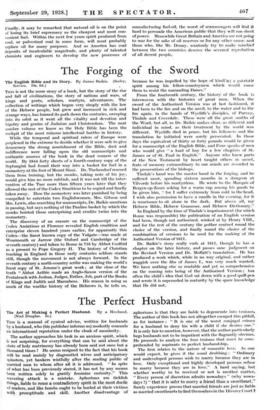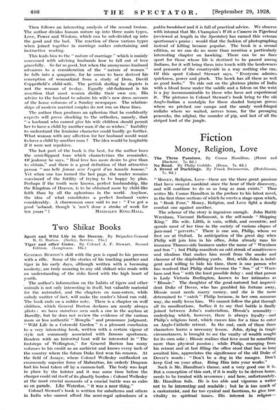The Perfect Husband
The Art of Making a Perfect Husband. By a Husband. (Noel Douglas. 5s.) Tilts is a manual of- cynical advice, written for husbands by a hasband, who (his publisher informs us) modestly conceals an international reputation under the cloak of anonimity.
The author approaches his task in an anxious spirit, which is not surprising, for everything that can be said about the state of holy matrimony has already been said not once but a thousand times ! He seems resigned to the fact that his book will be read mainly by disgruntled wives and anticipatory spinsters, yet hankers wistfully after the reading public of married men to whom after all it is addressed. " In spite of what has been previously stated, it has not by any means been written solely to gratify feminine curiosity." This wavering attack is a mistake. Aphorisms are ticklish things, liable to rouse a contradictory spirit in the most docile of readers, and like bombs ought to be hurled at their victims with promptitude and skill. Another disadvantage of
aphorisms is that they are liable to degenerate into truisms. The author of this book has not altogether escaped this pitfall, as for instance : " It is one of the worst conjugal crimes for a husband to deny his wife a child if she desires one." It is only fair to mention, however, that the author particularly begs husbands not to be impatient with the flagrantly obvious. He proceeds to analyse the four truisms that must be com- prehended by aspirants to perfect husbandship.
The first relates to the nature of romantic love. As one would expect, he gives it the usual drubbing : " Ordinary and undeveloped persons wish to marry because they are in love. Only exceptional and highly developed persons refuse to marry because they are in love." A hard saying, but whether worthy to be received or not is another matter. " Every person of discretion admits nowadays " (why nowa- days ?) " that it is safer to marry a friend than a sweetheart." Surely experience proves that married friends are just as liable as married sweethearts to find themselves in the Divorce Court ?
Then follows an interesting analysis of the second truism. The author divides human nature up into three main types, Love, Power and Wisdom, which can be sub-divided up into the good and the bad. The reaction of these various types when joined together in marriage makes entertaining and instructive reading.
This leads him to the " nature of marriage " which is mainly concerned with advising husbands how to fall out of love gracefully. So far so good, but when the anonymous husband advances to a consideration of the " nature of women " he falls into a quagmire, for he seems to have derived his conception of womankind from a study of Dora, David • Copperfield's child-wife. The pettish darling he depicts is • not the woman of to-day. Equally old-fashioned is his assertion that most women dislike their own sex. His advice to the husband to admire his wife's new dress savours of the home columns of a Sunday newspaper. The relation- ships of modern married couples do not run on these lines.
The author then produces an aphorism that he confidently expects will prove shocking to the orthodox, namely, that " a husband who cannot give his wife children should permit her to have a child by another man if she so wishes." Inability to understand the feminine character could hardly go further. What woman with any affection for her husband would want to have a child by another man ? The idea would be laughable if it were not repulsive.
The last part of the book is the best, for the author loses the semi-flippant tone which characterizes the remainder. Of jealousy he says, " Real love has more desire to give than to obtain," and there is a good definition of that attractive person " une belle femme avec l'esprit dun honnite homme." Yet when one has turned the last page, the reader remains convinced of the futility of trying to be happy by plan. Perhaps if the truth were known, perfect husbandship, like the Kingdom of Heaven, is to be obtained more by child-like faith than by all the aphorisms in the world. Anyhow, the idea of what constitutes a perfect husband varies considerably. A charwoman once said to me : " I've got a good 'usband, though 'e 'asn't done a stroke of work for





































 Previous page
Previous page